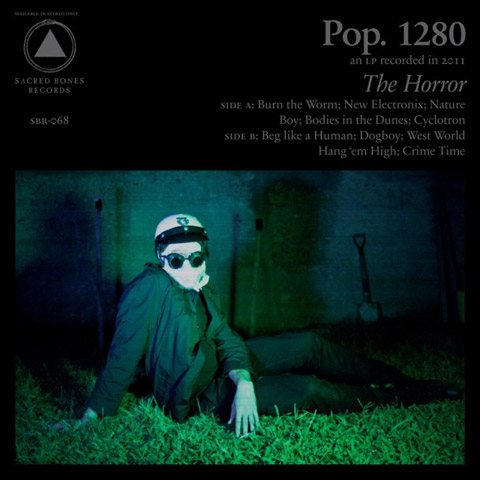Although the name Pop. 1280 comes from a 1964 novel by crime writer Jim Thompson, my immediate thought when seeing the New York band’s name was that it sounded like some specifics from a gun barrel, or was a reference to the year 1280 itself. And I went off on a tangent with that latter thought, wondering what pop music might have sounded like 731 years ago. And I thought, as I listened to their album The Horror, that this is probably what pop music from 1280 would have sounded like if there were electric guitars, or just electricity itself. I know, it’s a rather absurd thought, but The Horror is full of all such dreaded imagery, all masked in dark thunderous tones, that I couldn’t help but think of a long past feral time where grey rainclouds loomed constantly, rabid animals were everywhere, and massacre and murder were the norm (I can’t personally vouch that life in 1280 was actually like this – I just imagine it to be this way).
But a good deal of other writers seem to be content on calling this “post-apocalyptic road music,” which is probably a better description altogether. Think of the recent movie adaptation of The Road, and recall the colourless wash painted over nearly every scene where Viggo Mortensen travels the empty roads with his child, and you’ll get a good idea of the atmosphere present of The Horror. There’s a dreaded, almost hopelessly dark air filling the spaces, as vocalist Chris Bug sings brashly, like some twisted narrator, describing scenes from the titular lyrics of “Bodies In The Dunes,” to “[rubbing] one out in a priest’s disguise,” to first words on the record (which the album will probably remembered for, at the very least), “two dogs fucking”.. In terms of “pop” music, its lyrical content is closer to a Drift-era Scott Walker song to anything in the charts.
Still, there is an element of “pop” present in that there are still rousing choruses, lasting hooks and effective bridges. The riffs on “Dogboy” and “Nature Boy” could be Jack White’s own if they weren’t surrounded by poltergeist-worthy feedback, while the choruses on “Crime Time” and “Beg Like a Human” indent themselves in your head, and the forceful manner in which they are delivered gets them stuck there faster. But the fact that the record was built up around a lot of in-studio improvisation and writing seems to reveal itself over time. As clever as the chorus to “Beg Like a Human” might be, it struggles to last the full six minutes; by the end the effect and force of it is noticeably lessened. “West World” is a good moment of kinetic energy between the band, but it feels like it could do a lot more if allowed to open up whereas “Cyclotron” can feel like a bit of an empty vacuum during its five and half minute runtime. And some might find the full on pace and sound of the record a little wearing too. Once “Burn The Worm” kicks things off, things don’t really let up; even the record’s slower numbers aren’t really slow. “Hang ‘em High” keeps moving at a steady pace until it a huge wash of what sounds like ten guitars fills your speakers. “Beg Like a Human” is the record’s only song that feels like it hasn’t a noticeably different pace to it, but when it’s in the context of the nine other songs here, it’s easy to miss the change, especially when the chorus starts up for the first time.
The lack of “slower” numbers doesn’t really feel like a valid criticism, though, especially when the band really are at their best when they’re riding a burst energy. Closing track “Crime Time” is perhaps one of the best examples, as the song builds to a final rallying chorus. “I might need someone to cut me off” sings Bug in the bridge, and when everything hits in the chorus, it sounds like they’ll keep going until someone actually stops them. And I realize that the band aren’t likely out to create any sort of “pop” music, but that doesn’t mean their hooks aren’t effective. But the appeal is elsewhere – undulating atmospherics, ambiguous sonics, the disturbing images, Bug’s unsympathetic tone – and when it all comes together, The Horror is a product that has great appeal, both now and in future once the apocalypse has hit.

